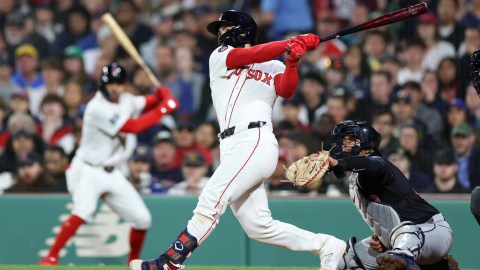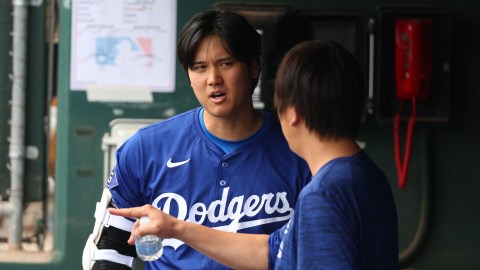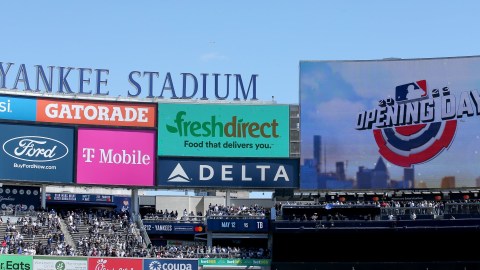I get it, Major League Baseball.
The annual All-Star Game is for the fans. C’mon, a home run derby?
A celebrity softball game that includes All-Star legends? Every team
getting represented by at least one player, whether they deserve to be
there or not? The fans not only getting to vote for the final players
to make both the AL and NL rosters, but getting to vote for the
starting lineups?! It’s entertainment, a diversion, a leisurely
distraction from the regular season, pure and simple.
Then how in the wide, wide world of sports does commissioner Bud Selig allow this “entertainment” to dictate who gets home-field advantage in the World Series?
It’s pure insanity.
This decision — which Selig and the owners agreed upon prior to the
2003 season, a year after the All-Star Game in the commish’s hometown
of Milwaukee ended in a disappointing and highly unpopular 7-7 tie —
was baseball’s attempt to spice up the Midsummer Classic amid sagging
ratings and a general apathy among the players involved.
Oh, sure … Selig defends the format to the death, suggesting, according to MLB.com that “the arrangement has led to more spirited, competitive All-Star Games.”
"Do I think this is good? You bet I do," Selig said in a teleconference Tuesday.
OK, fine, I’ll admit that the All-Star Game does, in theory, have
more importance now that the result supposedly means something.
But, first, does “more spirited” and “competitive” result in better
baseball? Not really. Consider basketball or hockey: Do the NBA or NHL
All-Star Games need to “mean something” to be fun? No. Would we get the
high-scoring, exciting, up-and-down contests we see if LeBron or Kobe were
playing for home-court advantage in the Finals? Not a chance. Both
teams would be focused on defense and stopping the opponent’s top
player.
Second, let’s not overstate the importance of the home-field
advantage. The American League has won every All-Star Game — and the
resulting home-field advantage — since the new format was instituted
in 2003. But the AL has won only three of the six World Series since
then, and two of those wins came in the form of Red Sox sweeps.
Third, and more importantly, isn’t it sending a mixed message to the managers and players?
“OK, do whatever you have to do to win …
“But have fun …
“And make sure to get everyone in the game … even the Nationals players …
“And make sure that no one gets hurt …
“But, jeez, really try to win.”
Red Sox manager Terry Francona doesn’t get it, either. He was
the manager of the AL team in 2008 that ended up winning in 15 innings.
After struggling to get everyone in the game without hurting anyone and
being sure not to leave the pitchers in too long, you can imagine his
misgivings.
"I don't agree with it [deciding home-field advantage]," he told The Providence Journal
on June 30. "I understand [Major League Baseball’s] point because they
want this game to be [important and entertaining] and they've
accomplished that. I just think you can't do both."
The message is equally mixed for fans. As a fan of baseball, you’d
like to see each league’s top players in the All-Star Game, right?
But what happens if you’re, say, a die-hard Red Sox fan? And, for
example, you think your Red Sox have a solid shot at making the World
Series. So what’s to stop you from doing everything in your power to
ensure an American League All-Star Game victory by, say, getting out
the vote for every scrub on the National League ballot? And let’s not
stop at voting for Lastings Milledge (like our friends at Sons of Sam Horn
have suggested), who spent much of the season in Triple-A — for the
Nationals, no less — before being traded to the Pirates. Let’s vote
for an entire team of scrubs.
Can’t you imagine the conversations at Fenway while Sox fans fill out their ballots?
“Who ya got on your AL ballot?”
“I got Mauer, Youk, Pedroia, Jeter, Longoria, Ichiro, Jason Bay and Torii Hunter.”
“Nice. What about the NL team?”
“I’m voting for Corky Miller, Kyle Blanks, Argenis Reyes, Brian Bixler, Jason Smith, Greg Norton, Steve Pearce and Lastings Milledge.”
“Sounds good. Should be a great game.”
Takes some of the majesty away from it, doesn’t it?
If Selig is set on the All-Star Game meaning something, why not
actually get the best players on the All-Star teams? There wouldn’t be
any Nationals or Orioles or Pirates or A’s and that would be OK. Let
the managers pick the rosters, pay the players to be there and let the
AL and NL really fight it out for supremacy. But that’s not the point,
says Selig. It’s for the fans.
But if it’s for the fans, is it right to be asking Boston fans to be
rooting for, say, Derek Jeter to come up with a clutch hit or cheering
for Mariano Rivera to close out the ninth? All so our Red Sox
can hopefully have home-field advantage if they make it to the World
Series? Seems pretty convoluted to me.
The fact is, baseball’s All-Star Game is not about the fans. It’s about making money.
If it were about the fans, it wouldn’t have to mean anything beyond
what it is: an entertaining showcase of the league’s best and most
popular players. But that’s not enough for Bud.
It has to mean something. Now I need to mock-cheer for Jeter. And
that hurts almost as much as trying to wrap my brain around the
hypocrisy of Selig’s mixed message.



